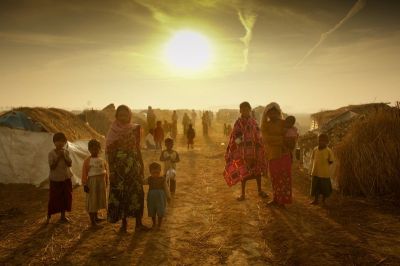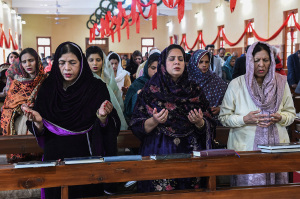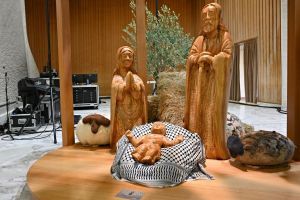Christians, don’t forget about the world’s refugees

With so much focus being given to the crisis on our southern border, it would be easy to forget about an equally pressing and critical humanitarian crisis: the world’s refugees. Key decisions loom near that could curb U.S. refugee resettlement or even eliminate it altogether. If we as Christians truly claim to stand united as defenders of the sanctity of all human life as ordained by God, we must be paying attention. Right now, significantly vulnerable lives are at stake.
The UNHCR estimates some 71 million people are forcibly displaced around the world. This is the largest humanitarian crisis the world has ever seen. If no one intervenes on their behalf, the vast majority will remain displaced in or around their countries for ten years or more. Historically, the United States has stepped in to welcome these vulnerable populations, but things are changing in detrimental ways.
When the “travel ban” was announced in 2017, promises were made that we would continue resettlement with a shift in focus towards persecuted Christians and others in the most desperate situations. Instead, we have dismantled many parts of the program and reduced the total number of refugees resettled each year from 85,000 in fiscal year (FY) 2016 to less than 30,000 in FY 2019. Now the White House is considering reducing resettlement again to numbers even lower than 2002, the year after 9/11.
If this happens, many people in the most desperate situations who would add great benefit to our nation will continue to languish in dreadful conditions. Threats to national and global security will increase because of prolonged exposure to extremism. As the rest of the world watches us, other developed countries will follow our lead and global refugee admissions will drop, as occurred after our reductions in 2017.
God’s love for the immigrant, refugee, and foreigner is a consistent biblical theme, and he calls his people to do the same. Jesus Christ himself, the greatest example of love, implores us to love our neighbor as we love ourselves, regardless of race, nationality, religion, or status. In July, evangelical leaders and pastors sent a letter to the White House stating, “Recognizing God’s love for the vulnerable and the persecuted, we are concerned for all who have fled persecution and who urgently need protection. And we are particularly concerned about the potential impact of your decision on fellow believers who are being persecuted for their faith.”
Yes, immigration-related topics are just as contentious in our churches as anywhere else in our current sociopolitical climate, but it is entirely possible to articulate a generous position towards the world’s most vulnerable people while also being committed to national security and upholding our laws. According to a report published by USCIS in 2018, our refugee resettlement program is continually improving its already stringent screening and vetting processes. These include biometric and biographic checks at multiple points, in-person interviews, and multiple security and medical clearances before a person or family is admitted into the U.S. The highest priority is given to people facing the gravest dangers, including women and children, and to family reunification of spouses, children, and parents. Many people are surprised to learn that the top four countries from which the U.S. government currently resettles refugees are the Democratic Republic of Congo, Myanmar, Ukraine, and Bhutan.
Our church in Tulsa, OK was blessed to receive a young refugee family from one of these countries in 2017. They were accepted for refugee resettlement because they were experiencing persecution for their Christian faith. The parents and children immediately became involved in our church and remain an active part of our ministries. Both parents have secured jobs and are contributing to our city. To us they are living proof that refugee resettlement is of great value to both the refugees themselves and the communities who receive them. If the changes at hand do in fact take place, no Christian refugee families from their country will be considered for resettlement.
Along with protecting vulnerable lives, refugee resettlement also enriches our culture and economy. According to New American Economy, entrepreneurship among refugees in the U.S. eclipses that of native-born Americans: 13 percent of refugees start their own businesses as opposed to just nine percent of American-born citizens. NAE conservatively estimates that refugees hold $56.6 billion in spending power and pay more than $20 billion in tax contributions to federal, state, and local governments each year.
Many of our nation’s top leaders recognize the value that refugees bring. In August, a group of eighteen U.S. Senators representing more than a third of U.S. states crossed the political aisle by sending a bi-partisan letter to the executive branch, imploring them “to increase the refugee resettlement cap and to admit as many refugees as possible within that cap.” The letter goes on to state, “At a time when global leadership is needed more than ever to solve the complex refugee problem — both at home and abroad — the United States is well-positioned to continue its long legacy as a protector of human rights. Refugee resettlement combines the compassion of America with an important tool necessary to pursue foreign policy objectives. The United States will continue to benefit from the talent, drive, and ambition of resettled refugees who seek freedom, and the refugee resettlement determination for FY2020 should reflect those goals.”
Following the letter from these lawmakers, military leaders added their voices to those in support of increased refugee resettlement. Earlier this month, a group of more than two dozen retired U.S. generals and admirals also sent a letter to the White House and added that our refugee resettlement program has “provided life-saving assistance, demonstrated our humanitarian leadership and values, supported allies hosting the vast majority of refugees, and served critical national security interests.”
If senators from both parties and commanding officers from multiple branches of the military can come to an agreement on continuing to resettle refugees generously and responsibly, certainly Christians and churches can work towards the same. We should be the most willing to overcome differences of opinion and partisanship for the dignity of hurting people.
For those may feel conflicted, I encourage you to dig into this topic with open heart and mind for the love of God and neighbor. As important decisions are being made, let’s continue to implore the leaders of our incredibly blessed and prosperous nation to maximize our commitment to the vulnerable in a way that reflects just how incredibly blessed, prosperous, and generous we are.
Eric Costanzo is lead pastor at South Tulsa Baptist Church in Tulsa, Oklahoma, a church that serves and includes many immigrant and refugee families. You can follow him on Twitter or visit his website at http://ericcostanzo.me.




























